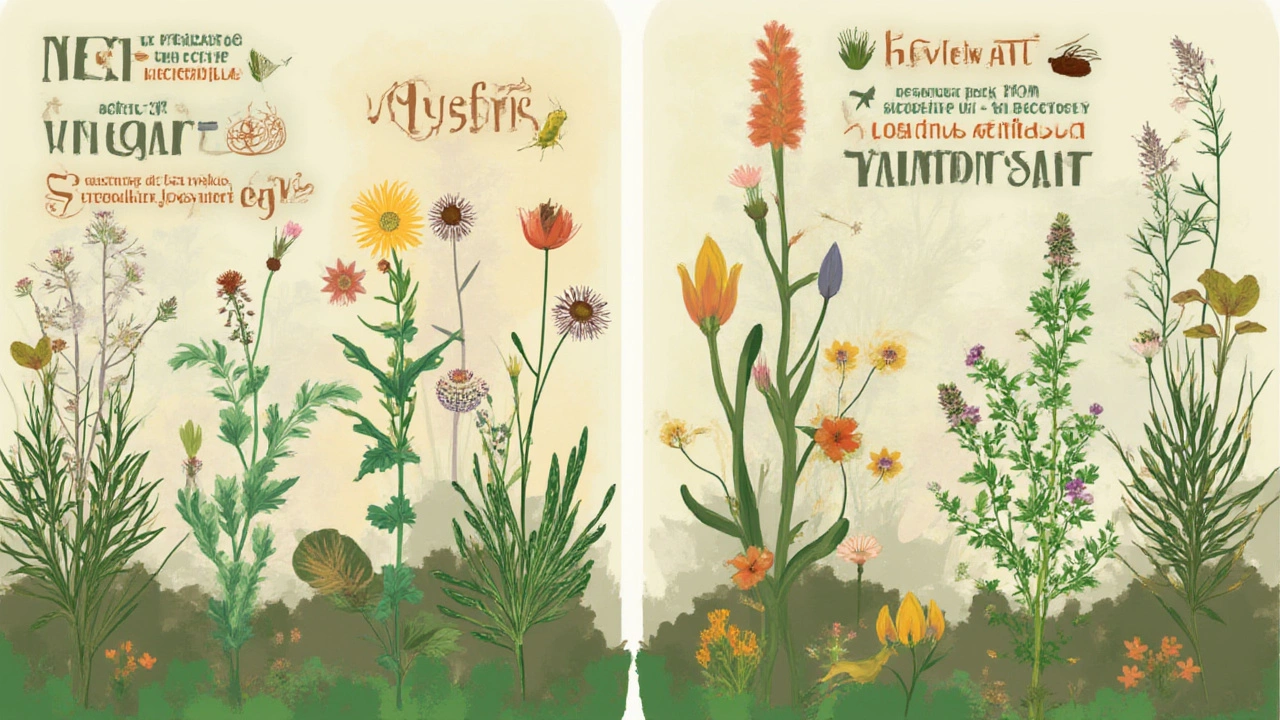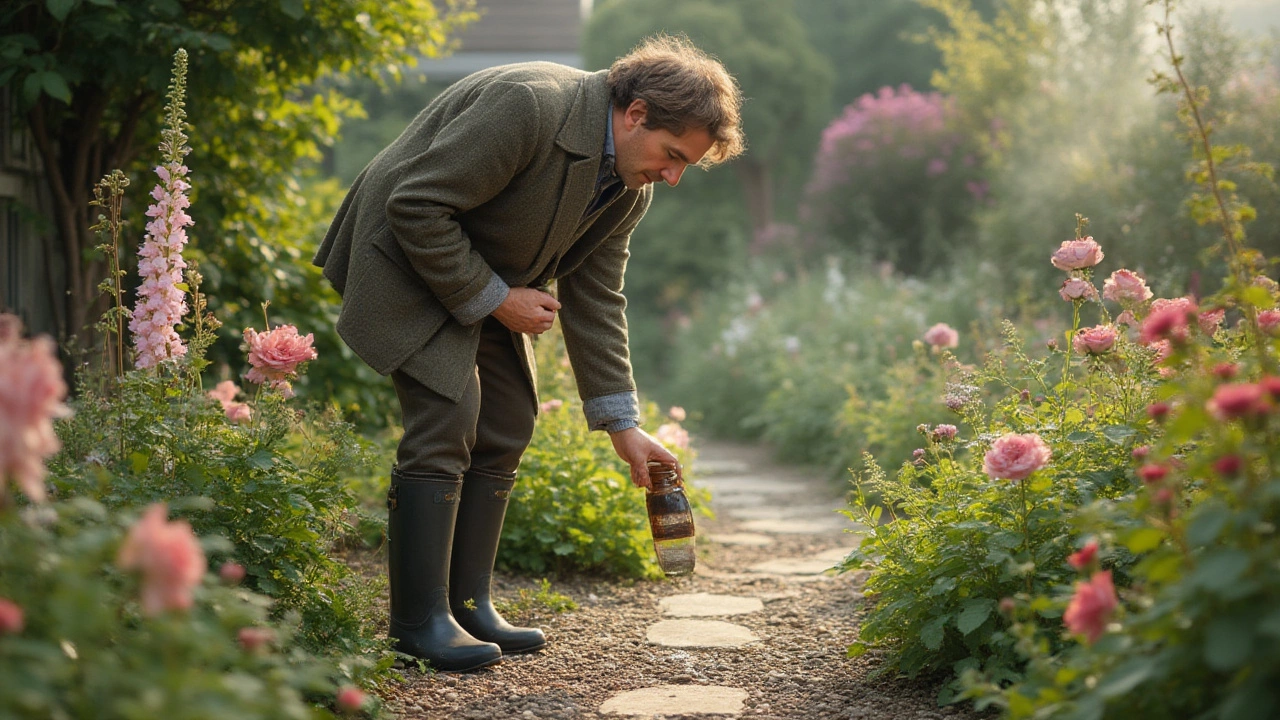Grab a bottle of vinegar, and you might feel like you’re holding a secret weapon for your garden. But is it truly a gardening miracle, or is the hype exaggerated? People swap wild stories about vinegar—how it wipes out weeds, scares off critters, or ruins soil forever. The truth has a twist, and if you want your garden to thrive (and not end up covered in brown patches), it pays to know exactly what happens when you pour vinegar onto your patch of green. Let's dig in and separate science from myths so you don’t end up regretting a little kitchen chemistry gone wrong.
How Vinegar Affects Plants, Soil, and Weeds
When vinegar—specifically white distilled vinegar—hits your garden, its effects depend on what exactly you splash it on. Vinegar gets its kick from acetic acid, which gives it that eye-watering tang in your salad. Commercial vinegar is usually about 5% acetic acid. This weak acid can actually kill many small weeds on contact, which is why so many gardening hacks mention it as an easy weed-killer. The acid literally dries out leaves, scorching green tissue and stopping weed growth. But here's a surprise: vinegar doesn't kill the roots if the plant is established and tough. It mostly fries the leaves, so dandelions and crabgrass often bounce back after looking dead for a week or two.
So, does vinegar zap all plants? Not exactly. While young, tender weeds may die off, bigger or perennial weeds usually need stronger stuff—or repeated applications. If you accidentally hit your tomatoes or marigolds with vinegar, the leaves might develop brown burns, wilt, or drop off completely. Some people assume this means vinegar "poisons" the soil. Actually, vinegar breaks down quickly after it touches earth. Acetic acid reacts with soil minerals and water, turning into harmless compounds. Your soil pH might dip slightly for a day or so, but odds are you’ll see no long-term changes. The dirt returns to normal before you know it.
But what about household versus horticultural vinegar? There’s a difference. Horticultural vinegar is way stronger—about 15-20% acetic acid. That’ll kill weeds faster but can injure skin, eyes, and even lungs if you’re not careful. Some people even know stories of pets getting sick after licking spots where concentrated vinegar was spilled. The regular kitchen stuff is far safer to use, but it still requires caution. Drizzle undiluted vinegar only on the plants you want to kill, never around prized flowers or veggies.
Let’s be real: vinegar isn’t a magic solution for weed-free flower beds. According to Professor Linda Chalker-Scott from Washington State University Extension, "Acetic acid is a contact herbicide, not a systemic one. It can control only small annual weeds and has little to no effect on larger perennials or grasses."
"You have to keep applying it, and that gets tiresome—plus, you risk harming your other plants," says Chalker-Scott.So don't expect to wipe out every weed from your garden path with a single spray. The quick effect on leaves gives a satisfying sense of action, but without repeat doses, those roots shrug it off.
There are claims about vinegar altering soil chemistry so much that nothing grows there again. That simply doesn't hold up. The soil rebounds. However, pouring bottles of vinegar repeatedly can pile up salt (from some vinegars) and make soil a little less friendly to life if overdone. So always use the lightest touch—target only what you mean to remove. Remember, plants are sensitive, and the wrong splash can leave scars on veggies, herbs, or flowers. Bottom line: vinegar acts as a homemade weed killer but is no replacement for digging or mulching. And don’t even think about using it as a fertilizer—the acid harms, it doesn’t help, most useful microbes or roots in your soil.

Smart Ways to Use Vinegar: Practical Gardening Tips
So you’re set on using vinegar in your garden—what’s the best way? The most common use is weed control on paths, driveways, or cracks in the patio. Kitchen-strength (5% acetic acid) white vinegar works best for this. Pour or spray it directly onto small, unwanted weeds on sunny days. High sun plus vinegar equals better and faster burn. If you aim for garden beds, put on gloves and use a paintbrush or a narrow spout to spot-treat weeds. The less you splash, the fewer accidents you'll have. It's best to limit vinegar to hard surfaces or spots away from prized plants. Avoid windy days, as even spray drift can scorch your beloved flowers or herbs.
Want to make your vinegar a little stronger for stubborn weeds? Some folks mix in a few drops of liquid dish soap. The soap helps break the surface tension, so vinegar sticks to the leaf and doesn’t just drip off. Just half an ounce of dish soap per gallon of vinegar does the trick. Still, don’t get tempted to go wild. More isn’t always better—for soil or your skin.
Vinegar has other, lesser-known garden uses. It can wash and disinfect containers or clay pots before planting, helping knock down lingering fungi or bacteria. Some people use it to clean tools—just rinse with water afterward to prevent corrosion. It can also keep cut flowers fresher for a day or two. Adding one tablespoon each of vinegar and sugar to a vase of water gives a cheap, easy preservative. If your hands get stained with green after gardening, a quick rub with diluted vinegar cleans things up nicely.
What about using vinegar to manage pests? Here’s the thing: vinegar isn’t an insecticide. It won’t kill most garden bugs. If you’re hoping to control ants, vinegar erases their scent trails temporarily, so they may get lost on the hunt. Want to trap fruit flies or fungus gnats? Mix apple cider vinegar with a touch of dish soap in a shallow dish—the gnats fall in and drown. But for garden pests on your plants, vinegar’s acetic acid is just as likely to harm the leaves as the insect. So skip spraying it directly on leaves for this purpose.
If you plan to use vinegar in homemade garden sprays, always test a tiny area first. Squirt just one leaf and check after a day. If the plant seems fine, you’re probably safe—but many veggies and delicate ornamentals burn at the slightest whiff of vinegar. For patio moss or algae, try pouring vinegar, waiting an hour, then brushing with an old broom. For cleaning birdbaths, vinegar is a safe, natural scrubber—just wash thoroughly before refilling.
Avoid using vinegar as a fix for poor soil or as an amendment to “balance” alkaline conditions. The soils in most home gardens have natural buffers—clays and organic matter—that swallow up any acid shock from vinegar. If you really need to change your soil pH or nutrition, use products made for gardening, not kitchen shortcuts.
One last warning: never use vinegar near ponds or streams. Acetic acid can kill aquatic life (like tadpoles or insects) if it runs off into water. Always watch the weather. Rain can spread your vinegar efforts where you don’t want it. Safety first—never mix vinegar with bleach or other cleaning products, even for garden tools, as this can release toxic fumes.

Common Myths and Mistakes: What to Watch Out For
Vinegar in the garden attracts a lot of myths, many passed around as "old-timer" wisdom. The internet helps spread even more. Let’s untangle the most common ones so your garden doesn’t suffer over a story that got out of control.
Myth #1: Vinegar is a natural, safe weed killer for all plants.
Well, not quite. Vinegar is natural—yes—but acetic acid is a harsh chemical regardless of origin. It kills by burning, not by some gentle natural force. Strong vinegar can harm pets, children, and wildlife if used carelessly, especially horticultural vinegar. Kitchen vinegar is milder but still gives contact burns to eyes or skin. Store it out of reach and always label sprays clearly.
Myth #2: Vinegar acts like Roundup and provides lasting control.
Nope. Vinegar wipes out soft leaves on weeds, but it does not travel down into the plant to kill roots (unlike glyphosate, the active chemical in Roundup). So, stubborn dock or deep-rooted dandelion usually bounce back. vinegar in garden is a speedy, superficial fix—expect to repeat it after heavy rain or in two weeks.
Myth #3: Vinegar makes soil forever infertile.
Absolutely not. The acid-neutralizing ability of most garden soils means that vinegar’s impact is short-lived, especially if you aren’t pouring gallons at a time. But pour too much repeatedly, and you might stress some soil microbes or earthworms. Moderation rules—treat vinegar like spice, not main course.
Myth #4: Vinegar sprays cure plant diseases.
No scientific studies support the claim that vinegar controls fungus, mildew, or other plant diseases on leaves. In fact, spraying vinegar guarantees some leaf damage. When unsure, lean on proven store-bought fungicides or safer home remedies.
Myth #5: Vinegar can be used freely to lower soil pH.
Only in very alkaline soils with lots of sand or rock, and even then, the effect is temporary and minimal. Use garden sulfur, mulch, or compost instead if you’re determined to shift soil pH.
Myth #6: Vinegar deters all critters.
While the strong smell can keep cats or deer away for a few hours, rain and sun wash it away. If you want real animal deterrence, physical barriers or commercial repellents are far more reliable. If you drench beds in vinegar to send raccoons packing, you might just end up with no beans and burnt lettuce.
The most common mistake folks make with vinegar? Not reading labels, using too much, or expecting miracle results. Some gardeners pour vinegar around tree trunks hoping to keep bugs away and end up killing the bark instead. Others spray liberally in veggie beds and lose half their crop. Treat vinegar like any chemical product: measure, target, and always go slow.
If you like experimenting, keep a gardening notebook. Jot down what weeds you targeted, when you sprayed, and what happened in a week, two weeks, and a month later. That’s how you learn what vinegar does in your unique patch of earth. And if you make a mistake, at least it’s a story worth sharing at your next backyard barbecue.
